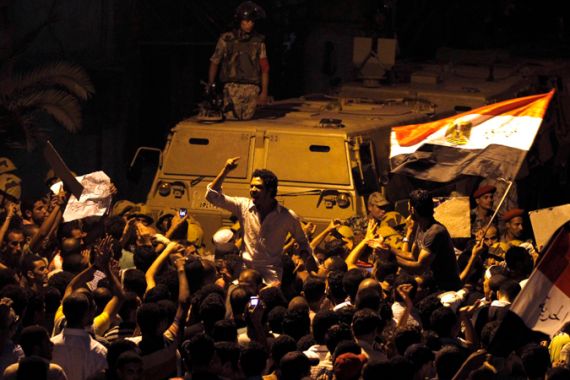Egypt withdraws ambassador from Israel
Cabinet demands compensation and investigation into cross-border shooting incident that left five Egyptian police dead.

The Egyptian government has withdrawn its ambassador to Israel for consultation in protest over a cross-border shooting incident on Thursday that left five Egyptian security personnel dead.
The cabinet has also summoned the Israeli ambassador in Cairo to provide answers on how an Israeli helicopter apparently accidentally killed Egyptian border police while chasing armed men whom Israel suspected of being connected to an attack near the port city of Eilat earlier that day.
The increased diplomatic pressure on Egypt’s neighbour came after Prime Minister Essam Sharaf led the cabinet in a special meeting on Friday and hundreds of protesters attacked barriers outside Israeli embassy in Cairo through the night.
Shalom Cohen, a former Israeli ambassador to Egypt, landed in Cairo on Saturday to help smooth the frayed relations between the two countries.
Sharaf’s cabinet has demanded an apology from Israel and compensation for the slain policemen.
By late Saturday afternoon, Israeli Defence Minister Ehud Barak had expressed “regret” over the deaths.
Amos Gilad, a senior Israeli defence official, said earlier it was not yet clear how the Egyptians died.
“No [Israeli] soldier intentionally aims any weapons at Egyptian police or soldiers,” Gilad said, adding that “perhaps terrorists fired at them, or something else occurred”.
Barak ordered a military investigation and a joint inquiry with the Egyptian army to clarify the circumstances of Friday’s incident.
Protesters tear down barriers
Demonstrators arrived at the Israeli embassy in southwest Cairo on Friday afternoon and stayed into Saturday morning, burning Israeli flags and demanding that Israel’s ambassador be expelled.
They called on the Egyptian military do more to protect its border in the Sinai Peninsula.
Protesters tore down metal and concrete barriers surrounding the embassy and stomped on them, Al Jazeera correspondent Rawya Rageh reported from the scene.
“People are still gathered outside the embassy and they are making quite a lot of noise,” she said.
“The protesters are insisting on making their voices heard and one of the protesters told me that they have no intention of leaving until the Israeli flag, perched on top of the 20th floor of the apartment building is brought down.
“Whether the deaths occurred as a result of direct gun fire or air raids still remains unclear and this is one the main contentious issues and one of the main reasons for the anger we were sensing outside the Israeli embassy … there is a lack of transparency regarding what exactly happened.
“We have not seen the army trying to forcefully remove protesters from the embassy, an indication perhaps that the military this time is really realising how strong the sentiment is on the street and how big the issue is for Egyptians, and that it has to thread carefully this time around.”
‘Urgent probe’
The killings came after four separate attacks in southern Israel on Thursday.
In the first attack, men with grenades, machine guns and a suicide vest struck a bus traveling between Beersheva and Eilat, a port city on the Egyptian border. Later, at least one bomb struck an Israeli army patrol along the border with Egypt, and more armed men fired an anti-tank missile at a civilian car.
Finally, during an evening press conference regarding the earlier events, Israeli counter-terrorism forces exchanged fire with more armed men north of Eilat.
Six civilians, one army soldier and one member of the counter-terrorism unit were killed. Israeli forces killed seven “terrorists” said to be involved in the attacks, the army said.
An Israeli helicopter pursuing armed men back into the Sinai Peninsula apparently accidentally shot and killed three Egyptian security personnel and fatally wounded two others later that night.
Israeli officials alleged that the attackers had come from Gaza and crossed into Israel after moving through the Sinai.
The killings have sparked anger among the Egyptian public, especially after Ehud Barak, the Israeli defence minister, said the attacks reflected “the weakening of Egypt’s hold in the Sinai and the broadening of activities by terror elements”.
Khaled Fouda, the Sinai governor, refuted Barak’s statements saying that Egypt has “increased security patrolling and checkpoints in Sinai”.
Sami Enan, the Egyptian military chief of staff, visited Sinai on Friday to look into the deaths and speak to troops.
|
|
“Strong response’
Amr Moussa, a front-runner for Egypt’s upcoming presidential elections who stepped down earlier this year as Arab League chief, urged a strong reaction.
“The blood of these conscripts is not cheap. All parties, including Israel, have to be warned against harming Egyptian soldiers,” he said.
“Israel and any other (country) must understand that the day our sons get killed without a strong and an appropriate response, is gone and will not come back,” Moussa wrote on Twitter.
“The blood of our martyrs which was spilled while carrying out their duties, will not be shed in vain.”
Saad al-Katatni, a leader of the Muslim Brotherhood’s Freedom and Justice Party, said in a statement published on the website for the Shorouk newspaper that “the Zionists must realise that Egyptian blood now has a price”.
Abdul Moneim Aboul Fotouh, a former Brotherhood member who is running for president, said that Egypt should expel the Israeli ambassador and halt gas supplies to Israel.
Egypt and Israel signed a peace treaty in 1979 which limits the number of military troops Egypt can station in the Sinai Peninsula, but protesters have called to revise the agreement after a popular revolution ousted president Hosni Mubarak in February.
The military, which took power after Mubarak’s overthrow, has said it would honour the treaty.